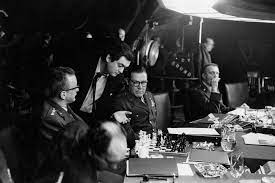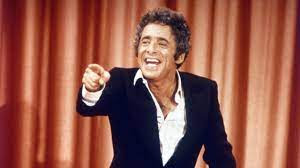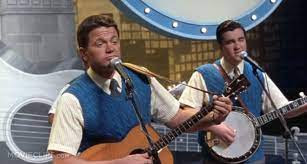Editor's Note: This is the second part of a transcript of an afternoon spent by Melbourne's Sunday Age film critic Tom Ryan and a trio of American funsters Christopher Guest, Harry Shearer and Michael McKean who were in town to promote their latest movie A Mighty Wind. If you wish to read Part One CLICK HERE
****************************
Part Two: Looking Back
[The orders have been taken, the food is being prepared and we return to the interview.]
TOM RYAN: Who are your inspirations?
MMcK: For film or music?
I was actually thinking in terms of your acting.
CG: We’re probably all gonna have the same answer.
MMcK: Some of the same answers.
CG: The first thing that I remember as a child are Laurel and Hardy. My father took me to see Laurel and Hardy. I also remember when The Golden Age of Comedy came out.
MMcK: Robert Youngson!
 |
| Stan Laurel, Oliver Hardy |
CG: And it was a compilation of Harold Lloyd and all the others. That was my first experience of that. And then later Peter Sellers was very much the person in terms of comedy. Michael and I were studying what was supposed to be serious acting at an acting school in New York City. But as far as comedians go, Peter Sellers was the one.
What about in terms of filmmakers?
CG: I think Truffaut was the first one that I connected to the most when I became aware of that job. Those films had a sense of humour. They weren’t pretentious. They were funny.
What about the classic era of Hollywood comedy? Preston Sturges…
CG: Some. I think I didn’t get into that until a little bit later. I wasn’t a film buff or a film student really until…
MM: You haven’t buffed anything really.
CG: Actually, not in days, no.
HS: So you’re not working on your prostate?
CG: No.
HS: Personally, I’m sad to say that I think Sturges is a bit overrated. Or maybe I’ve just not seen the one Preston Sturges film that’s gonna change my mind.
Palm Beach Story?
HS: You see, I’m not a big fan of that. I’m much more of a fan of Ernst Lubitsch.
MMcK: Yeah.
 |
| Carole Lombard, Jack Benny, Charles Halton To Be or Not to Be |
HS: Lubitsch is much more ‘it’ for me. When you get to a movie like To Be Or Not To Be! I started my show business career working for Jack Benny, so…
As a child?
HS: As a child.
MMcK: Well, I was a child too.
CG: Child-like at least!
MMcK: Yeah.
HS: So that was inspiring in every way, including that he actually hired me. But to see To Be Or Not To Be where a guy takes maybe the direst situation people knew about in the 20thcentury and makes a comedy, a mordant, smart, wonderful comedy. Well, that’s it.
MMcK: Pretty good leading lady too!
HS: Yeah. A pretty good cast all the way through.
What about you, Michael?
MMcK: As far as performers go, I gotta share Laurel and Hardy with Guest here, as well as Sellers. But also Alec Guinness, who I think is maybe the greatest actor I’ve ever seen. I had a chance to see him on stage. I saw him play Dylan Thomas on Broadway…
 |
| Alec Guinness as Dylan Thomas |
HS: Who won?
MMcK: Dylan by a hair. By a little curly hair. And I love a lot of people who are working right now. We were talking about Steve Buscemi before you turned on the tape, who’s one of those very watchable, wonderful actors. You know, a lot of those people who are maybe not big movie stars…
But I like some big movie stars too. As far as filmmakers go, I remember seeing two films in the space of a couple of weeks when I was a teenager…
HS: The Robe?
MMcK: Not The Robe, Harry. Sorry. The Loneliness of the Long Distance Runner by Tony Richardson, which I still think is one of the greatest films I’ve ever seen. And Stanley Kubrick’s Paths of Glory. For me, if they’d stopped making anti-war movies after that, I would have gotten the message pretty clearly, at that point. So those are two of my top filmmakers. But later on I also got to know the work of William Wyler and Howard Hawks and William Wellman. I said William Wellman twice, didn’t I?
(CG, HS and TR): No William Wyler.
And Billy Wilder!
HS: And Billy Wilder! Yeah.
MMcK: I’m crazy about Billy Wilder. Yes.
 |
| Stanley Kubrick ( second from left) directs Dr Strangelove |
HS: I was gonna add Stanley Kubrick. When I was in college I saw Strangelove. That was an amazing concept.
MMcK: Still is. Every bit as good today. Even a little scarier.
What about the musicians? Who are your musical reference points? I was actually reading this magazine while I was waiting, a review of Confessions Of a Dangerous Mind, about Chuck Barris. Apparently he wrote “Palisades Park” for Freddy Cannon and…
MMcK: I don’t think that’s true.
HS: There is so much bullshit being blown around about Chuck Barris, including the whole CIA story. But before you…
I checked my single and I found his name on it.
 |
| Chuck Barris |
MMcK: Mmm.
HS: But I highly recommend, before you take anything about Chuck Barris at face value, go and see The Gong Show Movie…
Alright.
HS: Which is a movie he wrote and directed about himself.
Really?
HS: Yeah. And see if you can keep your food down after seeing it...
MMcK: Yeah. He’s dangerous in the sense that an ugly throw-rug is dangerous.
Your musical influences?
MMcK: Mine?
Yeah. By the way, congratulations on that acapella you all did last night.
And from nowhere. That was wonderful.
MMcK: Oh, it was not from nowhere. It was from 10 years ago.
CG: Yes. But we hadn’t rehearsed it. We just started it and….
MMcK: Actually, sometimes we start Tap concerts with that. Before the lights come up, we throw ’em that as a bonus.
CG: And then they throw it right back as a bonus.
MMcK: And then we throw it back with a microphone with some gum stuck to it. I think the first music that really turned me on to what folk music was about, and also what songwriting was about, was a guy named Jimmie Driftwood, who wrote tons of songs and discovered tons of other songs. He’s most noted for one called “The Battle of New Orleans”…
Oh, I know it as a Johnny Horton song!
MMcK: It was a world-wide hit. And “Tennesse Stud” which was written by Eddie Arnold and other people. But Driftwood was a high school teacher and he wrote “The Battle of New Orleans” to teach his kids about the battle of New Orleans. It became a big hit, and he made a bunch of albums for RCA Victor. My father was working for RCA Victor at the time and I became this huge fan. I just loved his music.
CG: And he was a high school teacher? ‘Mr Driftwood, can I please go to the bathroom?’
MMcK: Absolutely. But it was Mr Morrison! His real name was Jim Morrison.
CG: Oh, God!
MMcK: I’ve always loved show music. And I’ve loved music that made me laugh. Like Ray Stevens’ stuff. He became kind of awful later on, but he wrote some very funny songs early on. And later The Beatles, The Kinks, The Who. Mostly The Beatles and The Kinks. And these days I love Bela Fleck and the Flecktones…
 |
| Bela Fleck and the Flecktones |
What’s their style? They sound like they should be doo-wop.
MMcK: No, no. Blue-grass, jazz, classical. He’s a banjo player. Get a hold of Bela Fleck and the Flecktones, especially a recent live album called “Live at the Quick”. He also employs three of the greatest musicians alive today. It’s ridiculous! Jeff Coffin, Victor Wooten, an insane bass player, and Future Man [real name, Roy], who is Victor’s brother and who invented a new instrument to replace the drums. It’s a phenomenal record.
CG: I think the first music I heard was swing music: ’30s, Benny Goodman, Fletcher Henderson, who was earlier, in the late ’20s. The first thing that really electrified me was hearing Bill Monroe, who was a bluegrass mandolin player. I saw him live in 1963 for the first time and started playing that kind of music. And bee-bop has been an influence…
HS: What about C-bop?
CG: It’s funny, but it never caught on. It should have. It was great. Right now, it’s very eclectic.
I still listen to a lot of classical music. I studied as a classical clarinetist. I went to a school where a lot of people were playing classical music and that’s what I was there for ostensibly. But I’m drawn now to mandolin music... And rock’n’roll.
HS: I grew up in a classical music family. That was the first music my parents exposed me to. My dad was trained as an opera singer. So I listened to that all the time and learned to recognize that music from very early on. The first music that I came to on my own was Frank Sinatra, Ella, Mel Torme.
 |
| John Michael Higgins (left) A Mighty Wind |
John Michael Higgins, who is in A Mighty Wind and is a wizard vocal arranger, has the same ear as I do, even though we’re separated by years growing up. But our ears were always attracted to arrangers, so when I listened to jazz I was always attracted to guys who were writing wonderful arrangements, like Marty Page or, for Sinatra, Nelson Riddle.
So it took me a long time to be able to even focus on soloists because I wanted to hear ensembles play. I wanted to hear voicings and movements and harmonies. And I was very anti-rock’n’roll until “A Hard Day’s Night”. That whipped me around and changed my life.
The album?
HS: The film and then the album. And then the whole thing, the whole Beatles thing. And now I listen to a lot of eclectic rock’n’roll and a lot of Brazilian music and New Orleans funk. You know we all come from so many different kinds of music.
That’s really interesting. Where do The Folksmen [the group in The Mighty Wind] come from then? Are you drawing on your personal histories with the Kingston Trio and …
MMcK: Well, obviously The Kingston Trio were kind of an inspiration because…
CG: Because they were a trio…
MMcK: That’s right. And they all have the same shirts. But they didn’t have a stand-up bass player. We cribbed that from The Limelighters. It was a commercial folk entity from the late ’50s. When people were expecting rock’n’roll to die at any minute, they were looking for what was going to replace it and there were a lot of folk hits in the late ’50s and early ’60s, which is kind of a starting point in the film.
TR: What about the others in the film?
 |
| Mitch (Eugene Levy) & Mickie (Catherine O'Hara) A Mighty Wind |
CG: Mitch & Mickey! We wrote those characters based on again…. There were so many husband-and-wife teams: there was Mimi and Richard Farina. He was a poet at that time where it was a big thing. As were Ian and Sylvia…
And Dick and DeeDee?
MMcK: Well, that was more rock’n’roll. But there were others – Jim and Jean – and invariably there was some kind of scenario in which their marriage would be imperilled in some way.
The Captain and Cookie?
[Guest raises his eyebrows as if to say, ‘Who?’]
You created them for Best in Show. Is that where the idea for doing something like A Mighty Wind comes from?
CG: Well, no. The idea came from the fact that I knew this kind of music, the fact that we had played as this group before, and I wanted it to do some music in film and I knew this cast was extremely musical. I knew they would probably be able to bring something like this off. This era had never been touched in terms of film, so that’s how it happened.
Some of the criticism of the film has said that you ignore the protest movement.
CG: Yes. But I’m not ignoring it. I chose not to have it in and it’s more of a mathematical problem than anything else. The protest singers were usually solo artists and to add that person would have unbalanced the film that was written for these people. Eugene and Catherine were going to be the duo. We had to have a duo. We had the trio and I thought it would be funny to have this big group. To have added another person would have thrown the whole movie off. And it’s not about that.
MMcK: Also all of the three acts in Irving Steinbloom’s stable were all not political. They were all very much motivated by the charts…
HS: And if you look at the pre-Bob Dylan world of folk music as it existed in America, it was never worried about politics. The Kingston Trio’s most political song was “Charlie on the MTA”, a protest about the inadequacies of the rapid transit system in Boston. Wow.
But Dylan was drawing on a range of…
HS: Yes. He was harking back to a much earlier era. He was harking back to Woody Guthrie. And he was political.
MMcK: And The Weavers were very political.
HS: But Dylan was specifically a reaction against this more commercial music that was dominating the world of folk music back then. And then it got more complicated because Peter, Paul & Mary started covering Bob Dylan’s songs and that changed the sound of those songs. Them doing “Blowin’ in the Wind” is a very different version of the song.
HS: And the vast majority of Peter, Paul & Mary songs were not political. “Leaving on a Jet Plane” is a very sentimental song.
MMcK: But there’s the question of jet fuel and the prices and the whole…
HS: Oh, yeah. Right.
MMcK: I read that into it, I guess.
(To Be Continued)
No comments:
Post a Comment
Note: only a member of this blog may post a comment.